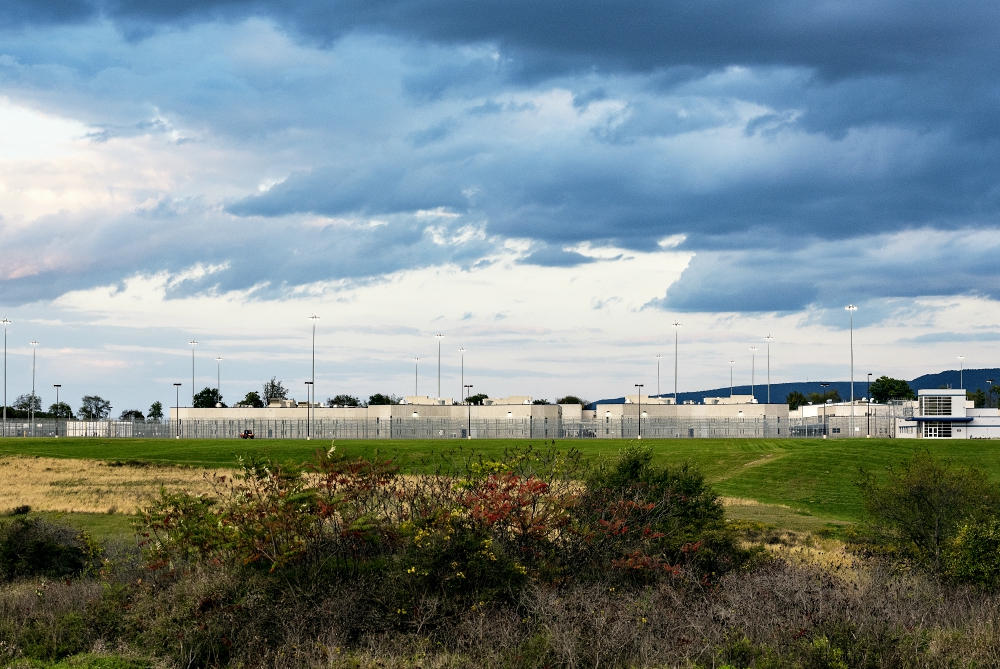
The State Correctional Institution at Rockview is seen in Benner Township, Pennsylvania. The prison houses the state's execution chamber. (Newscom/John Greim Photography)
In late June, the Pennsylvania Task Force and Advisory Commission on Capital Punishment issued a critical report detailing the issues surrounding capital punishment in the state. The 270-page report, released June 25, outlined numerous recommendations to address flaws the commission saw, ultimately leading the committee to call the death penalty "unnecessary."
The report comes nearly seven years after the Pennsylvania State Senate ordered a review of the death penalty in 2011. Four years later, current Gov. Tom Wolf issued a moratorium on the death penalty until he saw the results of this commission.
The state itself has only seen three executions since the U.S. Supreme Court reinstated the death penalty in 1976, with the last one occurring in 1999. All three executed inmates, who had "psychiatric problems," according to the commission's report, waived their appeals. In that same period, six inmates were exonerated.
As of July 2, the Pennsylvania Department of Corrections lists 148 inmates sitting on death row.
The bipartisan committee that released the report represented a wide group of experts including scholars, members of the police force, social workers, public defenders and religious leaders.
The report also represented the many issues surrounding the death penalty. It is broken down into 17 lengthy and data-driven subsections:
- Cost;
- Bias and unfairness in capital trials;
- Proportionality regarding the nature of the crime;
- Impact on and services for family members;
- Death row inmates with intellectual disabilities;
- Death row inmates with mental illness;
- Juries;
- State appeals and post-conviction procedures;
- Clemency;
- "Penological intent such as public safety or deterrence";
- Innocence;
- Alternatives to capital punishment;
- Legal counsel for defendants;
- Secondary trauma to those involved in a death penalty case;
- Length and conditions of confinement on death row;
- Lethal injection;
- Public opinion.
While the report itself is long, it's clear within the first 20 pages what conclusion the commission came to on the death penalty.
"Because the severely punitive alternative of life imprisonment without parole is available, the subcommittee on policy concludes that the death penalty is unnecessary, given the many objections to its use, the number of innocent persons wrongfully convicted and sentenced to death, and the effectiveness of the alternative," the commission wrote.
Advertisement
Additionally, when studying whether capital punishment is in any way "unfair, arbitrary, or discriminatory," the report found evidence suggesting significant bias. The report discovered differences in sentencing based on the county where the crime occurred, the race of the victim, and the type of legal representation the defendant received.
The report is not legally binding, and also not the first state commission to offer up similar concerns. The Pennsylvania commission offered a variety of recommendations should the state choose to continue sentencing people to death.
One of the major suggestions was to create a "guilty but mentally ill" plea that would be determined during the pretrial stage, while also screening for intellectual disabilities. While it is unconstitutional to execute a person who is intellectually disabled or mentally ill, the report found that as many as 14 percent of inmates currently on death row would be considered intellectually disabled and a quarter of them having "an active mental disorder," with many more needing mental health treatment.
Another major recommendation was to create a state-funded capital defenders office that would represent defendants in all phases of capital cases, including trial, appellate and state post-conviction stages. This suggestion comes after finding, "as of May 2018, 150 Pennsylvania death-row inmates … have had their convictions or sentences overturned on the basis of ineffective assistance of counsel. Death sentences in 93 of these cases were overturned because of counsel's failure to investigate and present mitigating evidence in the penalty phase."
"Pennsylvania is the only state that contributes nothing for indigent defense," Matthew Mangino, a member of the task force, wrote in The Legal Intelligencer. "All public defender services are funded locally with counties carrying the full burden of indigent defense costs."
The committee also recommended reducing the state's 18 instances of aggravating circumstances and demystifying the entire process surrounding the state's lethal injection protocol. The commission acknowledged that it couldn't be sure that the process was constitutional, as the state is allowed to conceal its lethal injection process.
In a press release, the national network Conservatives Concerned About the Death Penalty said it agreed with the many recommendations put forth in the report. The group applauded the report for addressing the "many areas of concern to growing numbers of conservatives, including its high cost, unfairness, and discriminatory nature."
"This report, like many before it in Pennsylvania and around the country, recognizes many of those problems [surrounding the death penalty]," Heather Beaudoin, national coordinator of Conservatives Concerned About the Death Penalty, said in the press release.
"Anything less than a full implementation of the report's recommendations represents a willingness to carry out executions regardless the system's significant flaws and the high possibility of error."
The release of the report comes at a pivotal time in Pennsylvania.
On the same day the report was released, Philadelphia District Attorney Larry Krasner faced criticism after his office chose to forgo the death penalty — instead offering a plea deal of life in prison for the two men who killed Philadelphia Police Sgt. Robert Wilson III in 2015.
In social media posts, the Philadelphia Fraternal Order of Police Lodge 5 accused Krasner of being unsupportive of Wilson's family. Krasner responded to the criticism by saying the family was split on the issue.
Krasner's "never" stance on the death penalty was a large focus of his campaign to become Philadelphia's district attorney in 2017, although since being sworn in, he has walked back on some of that surety.
In an interview following his swearing-in, Krasner reiterated his personal belief against the death penalty but acknowledged that "you never want to say never" in regards to capital punishment sentencing.
Krasner said the decisions of the district attorney office's homicide sentencing committee, along with his decisions, "are going to be informed by the fact that the death penalty is never imposed in Pennsylvania."
The release also comes during Wolf's re-election campaign against pro-death-penalty Republican candidate Scott Wagner, who has spoken out against Wolf's moratorium and would lift it, should he be elected in November.
In response to the plea deal Krasner's office offered, Wagner wrote on his campaign website, "I also know that our Governor, Tom Wolf, has put a moratorium on the death penalty and opposes the death penalty for cop killers, school shooters, and drug dealers. You can be assured that his moratorium will end when I take office in January of 2019."
[Kristen Whitney Daniels is assistant director of the U.S. Federation of the Sisters of St. Joseph and a former NCR Bertelsen intern.]








